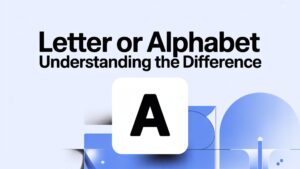When you’re writing about jobs, schedules, or describing work arrangements, you might pause and wonder: Should I write “full time” or “full-time”?
It seems like a tiny dash, but that hyphen changes everything. Choosing the right form matters if you want to maintain writing clarity and professionalism, especially in business communication, job applications, or any context involving employment terminology.
What’s the Issue with “Full Time” vs. “Full-Time”?

The confusion often arises because both “full time” and “full-time” are seen in writing, sometimes interchangeably. But they’re not the same in terms of grammatical structure.
The choice depends on how the word is being used in the sentence. Is it a noun or an adjective? Let’s dig into that.
The Correct Usage According to Grammar Experts
Grammar authorities like The Chicago Manual of Style, AP Stylebook, and Merriam-Webster agree:
- Use “full-time” when you’re using it as an adjective before a noun.
- Use “full time” when you’re using it as a noun or adverb.
✅ Correct: She has a full-time job.
✅ Correct: He works full time at the firm.
❌ Incorrect: She works full-time at the firm.
❌ Incorrect: He has a full time job.
This rule follows a broader grammar principle called the correct grammatical usage of compound words specifically compound adjectives.
Noun vs. Adjective: Why It Matters
Understanding noun vs adjective difference is crucial when deciding whether to use a hyphen.
- Noun/Adverb: When “full time” describes the duration someone works (“He works full time”), there’s no need for a hyphen.
- Adjective: When “full-time” comes before a noun (“a full-time employee”), it should be hyphenated.
This rule falls under the broader topic of grammar rules for compound modifiers.
Hyphen Usage and Compound Modifiers
Let’s look at a basic rule in English writing style:
Use a hyphen when two or more words work together as a single adjective before a noun.
That’s called a compound modifier. For example:
- A well-written article (not “well written article”)
- A high-speed train (not “high speed train”)
- A full-time position (not “full time position”)
This is the core of proper hyphen usage.
Real-World Examples: Emails, HR Documents, and More
📧 Sample Email 1: Correct Use (Adjective)
Subject: Confirmation of Full-Time Offer
Hi Jessica,
Congratulations! We’re thrilled to offer you a full-time position with our marketing team starting August 1st.
You’ll receive benefits and salary details in the next email.
Warm regards,
Daniel Cohen
HR Manager
📧 Sample Email 2: Correct Use (Noun)
Subject: Re: Work Schedule Confirmation
Hi David,
Yes, I confirm that I’ll be working full time starting next Monday. Let me know if I need to sign anything before then.
Thanks,
Amira Patel
📄 Internal Memo: Incorrect vs Correct
❌ Incorrect: All employees working full-time must submit reports by Friday.
✅ Correct: All employees working full time must submit reports by Friday.
This sentence uses “working” as the verb, so “full time” is functioning as an adverb. No hyphen needed.
Why “Fulltime” is Almost Always Wrong

Let’s address the elephant in the room.
“Fulltime” without a space or hyphen? That’s not grammatically correct in formal writing.
While you might see it on job boards or in casual writing, it’s not accepted in professional writing or editing guidelines. Standard dictionaries like Merriam-Webster and Oxford list “full-time” (hyphenated) as the correct form.
So if you’re searching “fulltime or full-time“—go with full-time every time.
Grammar tip: “Fulltime” may appear in URL slugs or SEO contexts, but it’s not correct for formal documents.
Understanding the Full-Time Employment Definition
Let’s zoom out and look at what full-time employment actually means.
Full-time employment definition:
A job requiring a person to work the standard hours typically recognized by a business or industry, often between 35 to 40 hours per week.
This type of employment typically includes:
- A regular schedule (e.g., 9–5)
- Health benefits
- Paid leave
- A complete schedule over a full working week
Knowing this helps you use the phrase more accurately.
Full Time vs Part Time: A Quick Comparison
| Criteria | Full-Time | Part-Time |
|---|---|---|
| Hours per week | 35–40+ | Typically <35 |
| Benefits | Often included | Often excluded |
| Job Security | Higher | Lower |
| Schedule | Continuous | Flexible |
This topic is popular in employment types, and helps distinguish phrases like full-time job vs part-time job.
Exploring Related Work Terminology
To spice up your writing, here are synonym use for writing variety:
Instead of always saying:
- Full-time job, try:
- Permanent role
- Regular position
- Continuous employment
Instead of working full time:
- Try:
- On a normal shift
- Covering standard hours
- Maintaining a complete schedule
Adding variety keeps your writing engaging and less repetitive.
Writing Tips: How to Choose the Right Form Every Time
Here’s a foolproof trick:
- Ask yourself: Is it describing something? → Use hyphen (full-time)
- Ask yourself: Is it an action or statement? → No hyphen (full time)
Examples:
- She applied for a full-time role. (adjective)
- He works full time. (adverb)
Also consider other hyphenated words in English grammar:
- Part-time
- Well-known
- Long-term
FAQs on Hyphenation and Usage
Q: Is “fulltime” ever correct?
A: Not in formal writing. Use “full-time” as the standard spelling.
Q: What’s the difference between “full time” and “full-time”?
A: It depends on whether you’re using it as a noun/adverb or adjective.
Q: What if I’m unsure?
A: If it comes before a noun, hyphenate. If not, skip the hyphen.
Final Thoughts: Which Form Should You Use?
So, fulltime or full-time? Stick with full-time when you’re writing professionally. Always avoid “fulltime” in polished content.
- Use “full-time” as an adjective: “She accepted a full-time position.”
- Use “full time” as a noun or adverb: “He works full time.”
By understanding the grammar clarity, compound words, and employment schedule terminology, you’ll improve not just your grammar—but also your credibility.









